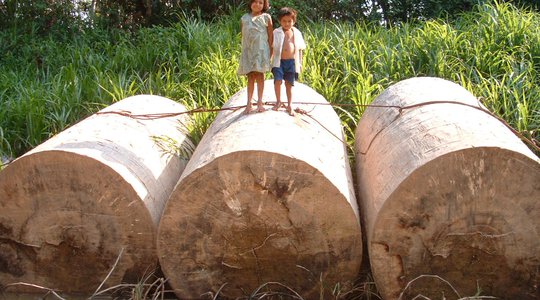Our 2014 report 'Peru's Deadly Environment' was launched after the killings of four indigenous leaders from Peru’s Amazon, murdered by illegal loggers they had been fighting to ward off their land.
These deaths are part of a growing trend. Peru is the fourth most dangerous country for environmental defenders, with 57 activists killed between 2002 and 2014. More than 60% of deaths occurred in the last four years, with indigenous communities worst affected.
The drivers of these abuses are clear: industrial-scale and illegal logging, infrastructure development projects, and the expansion of extractive industries mean that increasingly forest communities are pitched against powerful economic forces in the most remote parts of the country. As a result, Peru suffers from one of the worst rates of deforestation in Latin America. An estimated 91% of the country’s tropical forest will be degraded within 30 years if current plans for highways, oil wells, and mines go ahead.
If Peru’s indigenous population had rights to the land they live on, they would be best placed to protect their forests. But they don’t – the government is still sitting on 20 million hectares of unprocessed land tenure applications from forest-dependent communities.
Facts like this hint at the vested interests that conspire to devastate Peru’s forests. In our 2013 report 'Rocky Road', Global Witness investigated a proposed 270km highway that would destroy protected areas home to some of Peru’s last indigenous groups living in voluntary isolation. Our investigation exposed corrupt links between local officials and logging companies wanting to cash in on valuable timber. In a major success for Global Witness, the proposal was rejected by the Peruvian parliament.
Peru has committed to conserving 75% of its forests. This won’t happen if government forces in collusion with powerful private interests have their way, and forest defenders continue to be killed off and their communities held to ransom.
Since 2008, Global Witness has worked with groups such as Derecho Ambiente Recursos Naturales, Forum Solidaridad Peru and Earth Rights International to expose these threats to Peru’s forests and help promote their conservation. This partnership has seen improved transparency in the forest sector and greater scrutiny over the construction of large-scale hydroelectric projects in forests. But much more needs to be done.
 Environmental ActivistsReport
Environmental ActivistsReport ForestsReport
ForestsReport Forests
Forests










